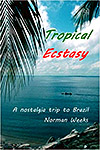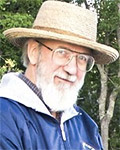Review — TROPICAL ECSTASY by Norman Weeks (Brazil)
 Tropical Ecstasy: A nostalgic trip to Brazil
Tropical Ecstasy: A nostalgic trip to Brazil
Norman Weeks (Brazil 1968-70)
Independently published 2020
282 pages
$12.00 (paperback); $4.99 (Kindle)
Reviewed by Michael Varga (Chad 1977–79)
•

Norman Weeks
How many RPCVs would like the opportunity to return to their place of service and survey the changes? That’s the premise of Norman Weeks’ memoir, Tropical Ecstasy. He returns to Brazil (in 1995) 25 years after his years as a Peace Corps Volunteer to his small city of Penedo.
Language is an important part of his return, and he tries to communicate as often as he can in his dusty Portuguese. He wants to increase his encounters with locals, and knows that relying on English will not allow for a very deep understanding of the country so many years later.
As he travels through Brazil — Manaus, Olinda, Recife, Maceio — on his way to his town, he laments that an oil slick, evidently from the boat he’s on while traveling on the Amazon, receives no attention from the captain, the air conditioning at his hotel doesn’t work, and the hotel seems to have a sparse maintenance crew to attend to such matters.
He finds most Brazilians hospitable to him, especially when he shares that he previously worked in Brazil as a PCV. Some are anxious to practice their English with him, but he finds few able to converse well so he switches back to Portuguese often.
Many Brazilians lament that Penedo was in much better shape when he was there in the 1960s. The municipal government seems particularly feckless and comes in for a lot of criticism from the locals. He finds that even as they are complaining, he enjoys hearing from them; and he remembers that perhaps he did not pay as much attention to the travails of the locals as they tried to improve their lives through more education or better jobs when he was a PCV.
Back in the 1960s, hopes for Penedo had relied on making it a tourist mecca, but he finds that many of the promises to improve the infrastructure for attracting tourists have never materialized. The city offers little but a cultural center and a natural pool in the reefs. But the author is impressed by the work ethic in that almost every Brazilian he encounters in Penedo are hustling between the scant jobs available to try to make ends meet. He sees few beggars. Some Brazilians confide that while they left Penedo for a while and worked in Rio or Sao Paulo, they returned because life in Penedo is less stressful, and have a low crime rate.
Weeks is able to make contact with some of the relatives of his old landlord, and gets some satisfaction in learning about how destiny has played its part in their lives. He doesn’t write about what he learns about them, but indicates that that is what drove him to want to return.
This is a very personal memoir that may be interesting to anyone who knows Brazil, or served or visited there. The chapters are short and easy to read. But it is a niche tale, with little to entice a general readership in terms of offering greater lessons about what our service as Peace Corps Volunteers means in a larger context.
If you love Brazil, the insights shared about the thinking of Brazilians in the 1990s might appeal to you. But otherwise, this is a book documenting some of the shortfalls of a specific town in Brazil that was going to be a tourist mecca, but instead turned out to be a way-station for ferries offloading goods for more attractive destinations.
In the appendix, Weeks provides both a glossary for many of the terms that don’t easily translate, and a gazetteer for many of the geographic references.
•

Michael Varga
Reviewer Michael Varga served in the Peace Corps in Chad. His Peace Corps novel, Under Chad’s Spell, is available at Amazon. Varga is a retired diplomat, who served primarily in the Middle East. Learn more at www.michaelvarga.com.
No comments yet.
Add your comment